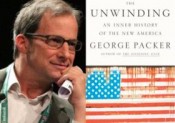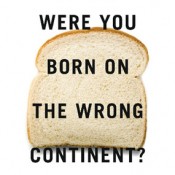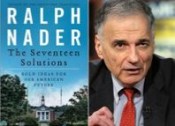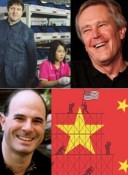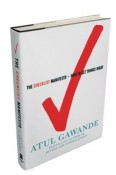Written on February 5th, 2015
Aired: 06/09/13
NYTimes review: “This book hums – with sorrow, outrage and compassion.”- #8 Best-seller
GEORGE PACKER has written a remarkable book, THE UNWINDING: An Inner History of the New America. In it, he argues that seismic economic shifts during a single generation have created a country of winners and losers, leaving the social contract in pieces and setting citizens adrift to find new paths forward. Packer sees America as a superpower in danger of coming apart at the seams, its elites no longer elite, its institutions no longer relevant. We’ve covered a lot of this ground before on Free Forum, but the power of THE UNWINDING is in how Packer tells his truth.
He begins – “No one can say when the unwinding began – when the coil that held Americans together in its secure and sometimes stifling grip first gave way. Like any great change, the unwinding began at countless times, in countless ways – and at some moment the country, always the same country, crossed a line of history and became irretrievably different. If you were born around 1960 or afterward, you have spent your adult life in the vertigo of that unwinding.”He follows the prologue with a series of newsreel headlines in the fateful year of 1978 and goes on to combine the intimate stories of several Americans–Dean Price, the son of tobacco farmers in the rural South who becomes an evangelist for a new economy in the rural South; Tammy Thomas, a factory worker in Youngstown trying to survive the collapse of her city; Jeff Connaughton, a Washington insider bouncing between political idealism and the lure of organized money; and Peter Thiel, a Silicon Valley billionaire with a radical vision of the future–with biographical sketches of this era’s leading public figures, from Newt Gingrich to Jay-Z, and collages made from newspaper headlines, advertising slogans, and song lyrics, Packer captures the flow of events and undercurrents that have set America in decline.
Publisher’s site for The Unwinding
Written on January 28th, 2015
Aired 10/03/10
THOMAS GEOGHEGAN, a graduate of Harvard and Harvard Law School, is a labor lawyer with Despres, Schwartz and Geoghagen in Chicago. He has been a staff writer and contributing writer to The New Republic, and his work has appeared in many other journals. Geoghagen ran unsuccessfully in the Democratic primary to succeed Rahm Emanuel in Congress a candidate, and is the author of six books including WHOSE SIDE ARE YOU ON?, THE SECRET LIVES OF CITIZENS, and, most recently, WERE YOU BORN ON THE WRONG CONTINENT?
In his new book, WERE YOU BORN ON THE WRONG CONTINENT?, today's guest makes a strong case that European social democracies - particularly Germany - have some lessons and models that might make life a lot more livable. Not only that, they could help us keep our jobs.
In comparison to the U.S., the Germans have six weeks of federally mandated vacation, free university tuition, nursing care, and childcare. But you've heard the arguments for years about how those wussy Europeans can't compete in a global economy. You've heard that so many times, you might believe it. But like so many things, the media repeats endlessly, it's just not true.
According to Geoghagen, "Since 2003, it's not China but Germany, that colossus of European socialism, that has either led the world in export sales or at least been tied for first. Even as we in the United States fall more deeply into the clutches of our foreign creditors-China foremost among them-Germany has somehow managed to create a high-wage, unionized economy without shipping all its jobs abroad or creating a massive trade deficit, or any trade deficit at all. And even as the Germans outsell the United States, they manage to take six weeks of vacation every year. They're beating us with one hand tied behind their back."
http://tomgeoghegan.com/
Written on January 22nd, 2015
Aired 10/14/12
I’ll be talking with NADER about the critical ideas in his wonderful new book, THE 17 SOLUTIONS: Bold Ideas for Our American Future. Learn more about RALPH NADER and SEVENTEEN SOLUTIONS at http://nader.org/
Some of the 17 solutions:
* Reforming the tax system
* Making our communities more self-reliant
* Reclaiming science and technology for the people
* Getting corporations off welfare
* Creating national charters for large corporations
* Reducing our bloated military budget
* Organizing congressional watchdog groups
* Enlisting the enlightened super-rich
* Use government procurement to spur innovation
RALPH NADER was recently named by the Atlantic as one of the 100 most influential figures in American history, one of only four living people to be so honored. The son of immigrants from Lebanon, he has launched two major presidential campaigns and founded or organized more than one hundred civic organizations. His groups have made an impact on tax reform, atomic power regulation, the tobacco industry, clean air and water, food safety, access to health care, civil rights, congressional ethics, and much more. He is the author of eleven books, including UNSAFE AT ANY SPEED; THE GOOD FIGHT; THE SEVENTEEN TRADITIONS; and his latest, THE SEVENTEEN SOLUTIONS: BOLD IDEAS FOR OUR AMERICAN FUTURE.
Written on January 15th, 2015
Aired: 03/31/13
I do my best to question conventional wisdom, but I had heard and repeated the fact that the US had lost its manufacturing and it was never coming back so often that I assumed it must be true. But I pick up the December 2012 issue of the Atlantic magazine recently and two articles jump out at me – both declaring that manufacturing is re-emerging. James Fallows writes of US startups exploiting new technologies to speed up the process of design-to-product, and Charles Fishman writes about US corporations like GE moving production back to the US.
James Fallows’ article, Mr. China Comes to America, opens with these words: “For decades, every trend in manufacturing favored the developing world and worked against the Unites States. But new tools that greatly speed up development from idea to finished product encourage start-up companies to locate here, not in Asia.” That got my attention! Charles Fishman’s article The Insourcing Boom goes even a step further. It’s opening words: “After years of offshore production, General Electric is moving much of its far-flung appliance-manufacturing operations back home. It is not alone.”
I make no bones about the fact that I like to report good news, but I don’t want to make nice or play Pollyanna. This information from these reporters strikes me as the real thing and I’m only too glad to admit I may have prematurely buried “made in America”.
James Fallows www.jamesfallows.com
Charles Fishman www.thebigthirst.com
Written on January 8th, 2015
Aired 03/14/10
Though Atul Gawande is a best-selling author, a Harvard professor, and an innovator in best practices for the W.H.O., he still performs 250-plus surgeries a year. A framed copy of Sylvia Plath's poem "The Surgeon at 2 a.m." stands on the desk in his office." Her surgeon's words: "I worm and hack in a purple wilderness." Gawande likes the Plath poem because it casts the surgeon in an ambiguous light.
"Most writing about people in medicine casts them as either heroes or villains," he says, "That poem captures the surgeon as a merely human, slightly bewildered and benighted person in a world that is ultimately beyond his control."
Medicine is just one area of our world that is becoming so complex that even the most expert professionals struggle to master the tasks they face. In his new book, The Checklist Manifesto, Gawande offers a disarmingly simple remedy: the checklist. Now being adopted in hospitals, the 90 second practice cuts fatalities In surgery by more than a third.
NOTE: This interview was recorded when Gawande was recently in LA, prior to Obama's healthcare summit and the latest legislative negotiations.
http://gawande.com/
